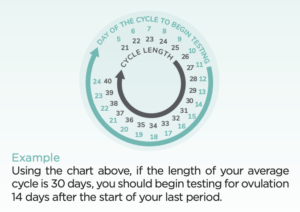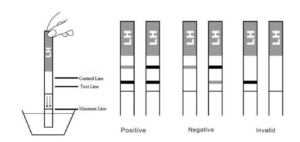Which ovulation predictor kit should I use?
Many of my patients who come in seeking treatment for fertility, ask my opinion on which ovulation predictor kits (OPK’s) to use, what cycle tracking app is best, what prenatal I recommend, and so on.
I have put together a comparison of three OPK’s in order to provide some insight into which product may be the best one for you. You will also see my clear favourite as well.
The biggest complaint I hear from patients is the cost of these strips. When purchased in a pharmacy, they can range anywhere from $3-8 per strip. With repeated use over time, this cost definitely adds up!
Firstly, what is an ovulation test kit?
Ovulation test kits, or ovulation predictor kits, determine when you are ovulating by measuring the hormone levels in your urine.
Ovulation is controlled by luteinizing hormone (LH). LH levels surge dramatically 24 to 36 hours before ovulation. After ovulation, they return to normal.
You can predict (with fairly good accuracy) when you are about to ovulate by pinpointing your LH surge. This is how OPKs work. They measure LH levels in your urine and compare them with a threshold to tell you if you are likely to ovulate soon.
OPKs work similarly to pregnancy tests in that they have two lines that form after immersing the test stick in urine.
When to test?
If you are unsure when you ovulate, it can be tricky to know when to start using the OPK’s so you’re not testing everyday and using more tests than necessary.
Check out this little info graph from Ovry:

Now, a product comparison:
In terms of company and product values, Ovry was my preference. Female founded in Canada, with their products manufactured in North America, those were all ‘checks’ in the positive column for Ovry.
- Strips are purchased through the Ovary website but delivered through Amazon.
- A medium sized box comes with 24 ovulation strips and 4 pregnancy tests.
- Purchase cost $47, which is is approximately $1.68 per strip.
- Test strips are recommended to sit for 10 minutes.
- Does not come with its own app connection, so if your memory is good then you can easily keep track of the progression of the line getting darker. Alternatively you would need to take pictures of the test results and store them on your phone.
- Comes with small cup to collect urine sample, too small if you ask me!
Pearl fertility is the first company I have seen to offer two different test strips to measure both Follicle Stimulating Hormone (FHS) AND Luteinizing Hormone (LH). While this offers more information, it is also more days of testing and more strips to use. This product is also sold in US dollars which is more costly for Canadian consumers (which all of my patients are)
- Strips are purchased through the Pearl Fertility website.
- Medium kit comes with 15 FSH strips,15 LH strips and 2 pregnancy strip tests.
- Cost $40 US, which is approximately $1.60CDN per strip.
- Comes with reusable strip holder, which can make collecting sample easier for some. (You pee directly on the stick instead of collecting into a cup)
- Pearl Fertility has its own app to track your menstrual cycle and take in-app pictures of your test strip results. It uses the visuals of a flower opening to show when and where you are in your fertile window. This app does not store the images, so you cannot see the progression of the strip line darkening as you get closer to ovulation, I find this less ideal.
- This is also the only app that suggested collecting first morning urine samples.
- Test strips are recommended to sit for 10-15 minutes.
Easy@Home is my recommendation for ease of use and cost value. Considering the product and connected app function well, it is impossible to beat the price on this product.
- Only available to purchase from Amazon
- Best value – kit with 100 OPK’S and 20 pregnancy test strips.
- Purchase price $40CDN – approximately $0.33 cents per strip *cheapest
- Premom has its own app to track your menstrual cycle and take in-app pictures of your test strip results. This app stores all the pictures you upload, so you can see the progression of the test line getting darker, which I find helpful.
- Test strips are recommended to sit for 5 minutes.
If you decide to give any of these products a try, I would love to hear how they work for you. I hope you find this product review and comparison helpful!










